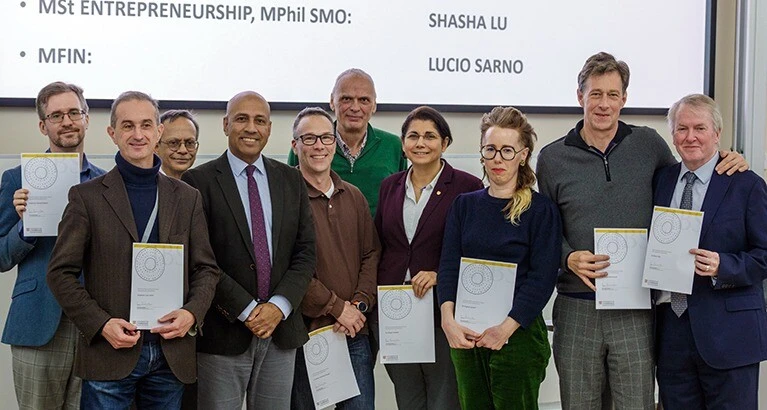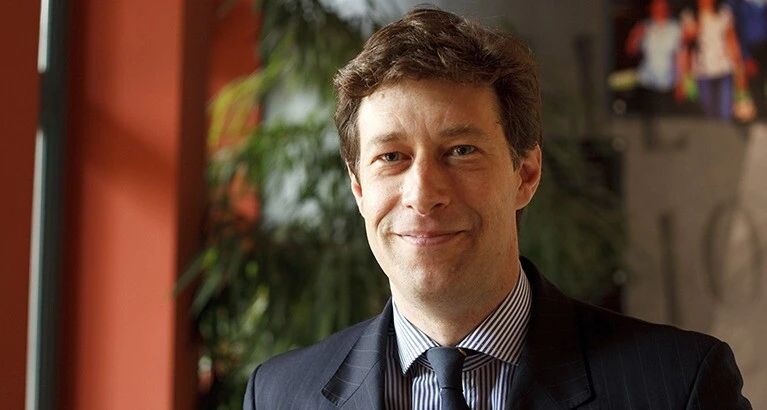Associate Professor in Corporate Governance
Fellow of the Centre for Business Research (CBR)
Fellow of Pembroke College
MBA, PhD (University of Cambridge)
My research interests include the convergence of national systems of corporate governance, human resource management, especially its implications for organisational trust, co-operation and commitment, the Japanese corporate system, and notions of corporate ownership. I was previously Director of Operations at Saxoncourt, and Director of Sales and Marketing at International Packaging.
I’m a member of the Organisational Theory and Information Systems subject group at Cambridge Judge Business School, which is engaged with cross-disciplinary themes including leadership.

Professional experience
Dr Learmount has been Director of Operations at Saxoncourt, and Director of Sales and Marketing at International Packaging. In 1998 he was awarded a Shimomura Fellowship at the Development Bank of Japan. Simon is a member of the Cambridge Corporate Governance Network.
Publications
- Selected publications
- Journal articles
- Books, monographs, reports and case studies
- Book chapters
- Working papers
Selected publications
- Learmount, S. and Roberts, J. (2006) “Meanings of ownership of the firm.” Journal of Interdisciplinary Economics, 17(1): 139-162
- Learmount, S. (2005) “Promoting design against crime.” In Clarke, R.V. and Newman, G.R. (eds.): Designing out crime from products and systems (vol 18 in the crime prevention studies series). New York, NY and Cullompton, Devon: Criminal Justice Press and Willan Publishing, pp.141-178
- Learmount, S. (2003) “Theorizing corporate governance: organizational alternatives.” Journal of Interdisciplinary Economics, 14(1): 159-173
- Learmount, S. (2002) “On Japanese corporate governance [translated into Japanese].” Corporate Auditor, 460: 4-6
- Learmount, S. (2002) Corporate governance: what can be learned from Japan? Oxford: Oxford University Press.
- Learmount, S. (2001) “International institutional investors and UK corporate governance [translated into Japanese].” In Corporate Governance Forum of Japan (eds.): Corporate governance: reform of UK companies. Tokyo: Commercial Law Centre, pp.176-193
Journal articles
- Learmount, S. and Roberts, J. (2006) “Meanings of ownership of the firm.” Journal of Interdisciplinary Economics, 17(1): 139-162
- Learmount, S. (2003) “Theorizing corporate governance: organizational alternatives.” Journal of Interdisciplinary Economics, 14(1): 159-173
- Learmount, S. (2002) “On Japanese corporate governance [translated into Japanese].” Corporate Auditor, 460: 4-6
- Learmount, S. and Remmer, B.R. (1997) “Future scenarios for the Chinese telecoms market: what might the future hold for the world’s largest telecoms market?” Telecommunications, 31(3): 61-[100]
Books, monographs, reports and case studies
- Learmount, S. (2002) Corporate governance: what can be learned from Japan? Oxford: Oxford University Press.
- Learmount, S., Oliver, N. et al. (2000) Design against crime: a report to the Design Council, the Home Office and the Department of Trade and Industry. Cambridge: University of Cambridge Publications Centre.
Book chapters
- Learmount, S. (2005) “Promoting design against crime.” In Clarke, R.V. and Newman, G.R. (eds.): Designing out crime from products and systems (vol 18 in the crime prevention studies series). New York, NY and Cullompton, Devon: Criminal Justice Press and Willan Publishing, pp.141-178
- Learmount, S. (2001) “International institutional investors and UK corporate governance [translated into Japanese].” In Corporate Governance Forum of Japan (eds.): Corporate governance: reform of UK companies. Tokyo: Commercial Law Centre, pp.176-193
- Cadbury, A. and Learmount, S. (1999) “Corporate governance and globalisation.” In Slemen, W. (ed.): UK and Japan: bridging the millennium, bridging the countries: Anglo-Japanese concerns. London: Daiwa Anglo-Japanese Foundation, pp.93-105
Working papers
- Learmount, S. (2002) “Theorizing corporate governance: new organizational alternatives.” ESRC Centre for Business Research, Cambridge University, Working Paper No.237
- Learmount, S. and Roberts, J. (2002) “Meanings of ownership of the firm.” ESRC Centre for Business Research, Cambridge University, Working Paper No.238
News and insights
Faculty news
2025 Cambridge Judge excellence in teaching awards
Eleven members of the Cambridge Judge Business School faculty are awarded teaching prizes for excellence across the Business School’s various programmes.
Boards of directors must address sustainability as a key factor in their firms’ financial risks and opportunities, says World Economic Forum article co-authored by Dr Simon Learmount.
Faculty news
Why company boards are vital to climate change
Dr Simon Learmount of Cambridge Judge Business School is co-chair of a new World Economic Forum panel, the Climate Governance Community of Experts, that seeks to boost the climate-change skills and knowledge of board members.
Media coverage
Business Because | 20 March 2020
Why the world needs ethical leadership
Ethical leadership is in high demand in 2020, writes Thomas Nugent in BusinessBecause. Dr Simon Learmount, Lecturer in Corporate Governance at Cambridge Judge Business School, says it’s important for business leaders to understand accountability: “That means understanding to whom and for what you are accountable as a leader. Leadership doesn’t exist in isolation, it is situational. To be a really effective leader it’s really important to understand the context in which you operate.” Simon says it’s not enough only focusing on profitability or delivering to shareholders. The focus “has to be on making sure we deliver for society”.
The Times | 30 September 2019
Brash and brilliant, but are tech titans like WeWork chief past it?
Dr Simon Learmount, Lecturer in Corporate Governance at Cambridge Judge Business School, comments on management issues affecting founders of tech companies like WeWork and Uber. “We know from psychological studies that people who are given a lot of power very quickly often don’t know what to do with it. They end up existing in a bubble,” he said.
Financial Director | 6 September 2019
ArcelorMittal tight-lipped on CEO’s board attendance
Dr Simon Learmount, Lecturer in Corporate Governance at Cambridge Judge Business School, comments on board meetings and corporate governance. “In principle, directors need to make sure they are being transparent to shareholders, whether they recuse themselves or at least make plain to investors they do have other interests,” he said.
CCTV, 11 April 2018
UK scholars comment on Xi Jinping’s book on governance




